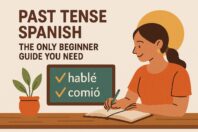Commonly Used Spanish Verbs With Prepositions

Get our free email course, Shortcut to Conversational.
Have conversations faster, understand people when they speak fast, and other tested tips to learn faster.
More infoIn a separate post, we covered the most important Spanish prepositions that beginner students should know, and once you are familiar with these, then you should know the most common Spanish verbs with prepositions, whether the verb is typically used with a preposition, or the verb requires the use of preposition.
Before we do that, let’s recap how prepositions are used.
In simple terms, Spanish prepositions help us add more information to a sentence, and in most cases, completely change the meaning of a sentence.
For example, let’s see how different propositions change the meaning of the below sentence.:
- Talk to your employees – Habla con tus empleados
- Talk about your employees – Habla de tus empleados
- Speak for your employees – Habla por tus empleados
As you can see, in the above examples the prepositions CON, DE and POR completely change the meaning of the same sentence.
In this post, we are going to list verbs that are commonly used the prepositions.
Commonly Used Verbs With The Preposition: A
| Infinitive verb | Verb with preposition | English equivalent |
| Visitar | Visitar a | To visit |
| Acostumbrarse | Acostumbrarse a | To get used to |
| Ayudar | Ayudar a | To help |
| Cuidar | Cuidar a | To take care of |
| Entrar | Entrar a | To enter |
| Ir | Ir a | To go to |
| Empezar | Empezar a | To start |
| Oler | Oler a | To smell like |
| Parecer | Parecerse a | To look like |
| Arriesgar | Arriesgarse a | To take the risk to/ Take a chance |
| Aprender | Aprender a | To learn |
Sidenote:
You only use visitar + a when you talk about visiting people. You don’t need the preposition “a’” when visiting a place. For example, “I’m going to visit Venezuela” would be “Voy a visitar Venezuela”.
The same concept applies to ayudar + a, which is used when speaking about helping people. However, when you use a reflexive pronoun, for example to ask for help, you don’t say ” Ayuda a mi”. Instead, would say “ayudame a” which means “help me to”
Examples:
- I visited my grandmother on sunday – El domingo visité a mi abuela
- I’m going to visit my friend – Voy a visitar a mi amigo
- My son is used to walking to school – Mi hijo está acostumbrado a ir a la escuela caminando
- You must get used to your new boss – Debes acostumbrarte a tu nuevo jefe
- I help the volunteers of the Church – Yo ayudo a los voluntarios de la Iglesia
- Help me to clean the garage – Ayúdame a limpiar el garaje
- I have to take care of my little sister tonight – Tengo que cuidar a mi hermanita esta noche
- Can you take care of my cats this weekend? – ¿Puedes cuidar a mis gatos este fin de semana?
- I’m entering classes – Estoy entrando a clases
- They just entered the house – Ellos acaban de entrar a la casa
- We are going to the beach tomorrow – Vamos a ir a la playa mañana
- Are you coming to the meeting? – ¿Vienes a la reunión?
- I have to start doing exercise – Tengo que empezar a hacer ejercicios
- The party starts at 9:00 pm – La fiesta empieza a las 9:00 pm
- The house smells like flowers – La casa huele a flores
- Your perfume smells like coconut – Tu perfume huele a coco
- This hotel looks like one we visited before – Este hotel se parece a uno que visitamos antes
- You look like your mother – Te pareces a tu madre
- I’m going to take a chance and invest my money in that – Voy a arriesgarme a invertir mi dinero en eso
- She is learning to dance salsa – Ella está aprendiendo a bailar salsa
- I have to learn to drive cars – Tengo que aprender a manejar carros
Commonly Used Spanish Verbs With The Preposition: DE
| Infinitive verb | Verb with preposition | English equivalent |
| Enamorarse | Enamorarse de | To fall in love with |
| Acabar | Acabar de | To have just finish something |
| Arrepentirse | Arrepentirse de | To regret |
| Encargarse | Encargarse de | To take charge of |
| Olvidar | Olvidarse de | To forget to |
| Parar | Parar de | To stop |
| Tratar | Tratar de | To try to |
| Cansarse | Cansarse de | To get tired of |
| Desconfiar | Desconfiar de | To distrust |
| Despedirse | Despedirse de | To say goodbye to |
| Disfrutar | Disfrutar de | To Enjoy |
| Hablar | Hablar de | To talk about |
Examples:
- She’s in love with that actor – Está enamorada de ese actor
- I fell in love with you – Me enamoré de tí
- I just finished having lunch – Acabo de terminar de almorzar
- They have just finished the relationship – Ellos acaban de terminar la relación
- I regret having eaten so much cake – Me arrepiento de haber comido tanto pastel
- Don’t regret what you said – No te arrepientas de lo que dijiste
- Take charge of talking with the workers – Encargate de hablar con los trabajadores
- Can you take care of the children today? – ¿Puedes encargarte de los niños hoy?
- I forgot to congratulate her – Me olvidé de felicitarla
- Don’t forget to call your grandmother – No te olvides de llamar a tu abuela
- You need to stop eating so much – Debes parar de comer tanto
- Stop screaming – Para de gritar
- I will try to be ready quickly – Voy a tratar de estar lista rápido
- Try not to drink too much alcohol at the party – Trata de no beber tanto alcohol en la fiesta
- I’m tired of swimming so much – Me cansé de nadar tanto
- He got tired of playing video games – Ya se cansó de jugar videojuegos
- I don’t trust people that my dog doesn’t like – Desconfío de las personas que a mi perro no le gustan
- He mistrusts a partner in his work – El desconfía de un compañero en su trabajo
- I’m going to say goodbye to everyone – Voy a despedirme de todos
- Go and say goodbye to your cousins – Ve y despídete de tus primos
- I’m going to enjoy my vacation – Voy a disfrutar de mis vacaciones
- Enjoy your youth – Disfruta de tu juventud
- Let’s talk about the sales of the month – Vamos a hablar de las ventas del mes
- Let’s talk about us – Hablemos de nosotros
Commonly Used Spanish Verbs With The Preposition: CON
| Infinitive verb | Verb with preposition | English equivalent |
| Casarse | Casarse con | To marry to |
| Soñar | Soñar con | To dream about |
| Contar | Contar con | To count on |
| Colaborar | Colaborar con | To collaborate with |
| Confundir | Confundir con | To confuse with |
| Encontrarse | Encontrarse con | To meet with |
| Enfadarse | Enfadarse con | To get angry with |
| Entretenerse | Entretenerse con | To entertain with |
| Divertirse | Divertirse con | Have fun with |
| Jugar | Jugar con | To play with |
Examples:
- I married my best friend – Me casé con mi mejor amigo
- She is getting married with a red dress – Ella va a casarse con un vestido rojo
- Don’t watch that movie or you are going to dream with ghosts – No vean esa película o ustedes van a soñar con fantasmas
- I’m going to dream about your eyes – Voy a soñar con tus ojos
- You can count with us – Puedes contar con nosotros
- You can count on that – Puedes contar con eso
- You must collaborate with household chores – Debes colaborar con las tareas del hogar
- We can collaborate with food – Podemos colaborar con comida
- They confused me with a teacher – Me confundieron con una profesora
- Don’t get confused with the exam questions – No te confundas con las preguntas del exámen
- I met my neighbor in the market – Me encontré con mi vecina en el mercado
- I did not find anyone to go to the prom – No encontré con quien ir al baile de graduación
- I’m angry with her – Estoy enfadada con ella
- The workers are angry with the boss – Los trabajadores están enfadados con el jefe
- I entertain myself with the netflix series – Me entretengo con las series de netflix
- They are entertained with anything – Ellos se entretienen con cualquier cosa
- We have fun with that movie – Nosotros nos divertimos con esa película
- I always have fun with my sister – Siempre me divierto con mi hermana
- I’m going to play with my friends – Voy a jugar con mis amigos
- Let’s play with the ball – Vamos a jugar con la pelota
Commonly Used Spanish Verbs With The Preposition: POR
| Infinitive verb | Verb with preposition | English equivalent |
| Decidirse | Decidirse por | To decide on |
| Preguntar | Preguntar por | To ask for |
| Hablar | Hablar por | To speak for |
| Preocuparse | Preocuparse por | to worry about |
Examples:
- They don’t decide on a dress – Ellas no se deciden por un vestido
- You have to decide for one of them – Tienes que decidir por uno de ellos
- I’m going to ask about these shoes – Voy a preguntar por estos zapatos
- Ask for your friends – Pregunta por tus amigos
- I can not speak for you – No puedo hablar por tí
- Politicians speak for their country – Los políticos hablan por su país
- Don’t worry about that, everything will be fine – No te preocupes por eso, todo saldrá bien
- They are worried about their notes – Ellos están preocupados por sus notas
Commonly Used Spanish Verbs With The Preposition: EN
| Infinitive verb | Verb with preposition | English equivalent |
| Pensar | Pensar en | To think about |
| Divertirse | Divertirse en | To have fun at |
| Confiar | Confiar en | To trust in |
| Participar | Participar en | To participate in |
| Tardar | Tardar en | To take time to |
| Quedar | Quedar en | To stay at , To agree to do something |
Examples:
- I can’t stop thinking about you – No dejo de pensar en tí
- Speak lower, You don´t let me think about anything else – Habla más bajo, no me dejas pensar en nada más
- We are going to have fun at the fair – Nos vamos a divertir en la feria
- They had fun at their cousins’ house – Ellos se divirtieron en la casa de sus primos
- Do not trust people who treat others badly – No confíes en personas que tratan mal a otros
- We must trust our children – Debemos confiar en nuestros hijos
- I want to participate in the poetry contest – Quiero participar en el concurso de poesía
- He participated in that play – El participó en esa obra de teatro
- It should not take long to arrive – No debe tardar en llegar
- They will take time to deliver the documents – Van a tardar en entregar los documentos
- We are going to stay in the house tonight – Nos vamos a quedar en la casa esta noche
- He agreed to help us with the moving – Él quedó en ayudarnos con la mudanza
Spanish Verbs With Prepositions: Exercises
Fill the blank space with the correct preposition
1. Tengo que ayudar ___ mi mamá con la lavandería
(I have to help my mom with the laundry)
2. Me olvidé ___ mandar el mail
(I forgot to send the mail)
3. Anoche soñé ___ dinosaurios
(Last night I dreamed about dinosaurs)
4. Voy a visitar ____ mis amigos del colegio
(I’m going to visit my school friends)
5. Yo hablaré ____ ellos
(I will speak for them)
6. Vamos a disfrutar ____ el fin de semana
(Let’s enjoy the weekend)
7. ¿Puedes venir ____ verme?
(Can you come to see me?
8. Vamos a encontrarnos ____ tu madre en la escuela
(We are going to meet your mother at school)
9. Tenemos que pensar ____ el nuevo plan de ventas
(We have to think about the new sales plan)
10. Debo decidirme ____ una universidad y no sé cuál
(I have to decide for a university and I do not know which one)
11. Tienes que parar ____ beber alcohol
(You have to stop drinking alcohol)
12. Ella se va a quedar ____ su casa
(She is going to stay at home)
13. Todo el tiempo me confunden ____ mi madre
(All the time they confuse me with my mother)
14. Estoy cerca de tu casa, no me tardo ____ llegar
(I’m near to your house, I won’t take long to get there)
15. Vamos a hablar ____ nuestros derechos y deberes
(We are going to talk about our rights and duties)
Answers
1. Tengo que ayudar a mi mamá con la lavandería
2. Me olvidé de mandar el mail
3. Anoche soñé con dinosaurios
4. Voy a visitar a mis amigos del colegio
5. Yo hablaré por ellos
6. Vamos a disfrutar de el fin de semana
7. ¿Puedes venir a verme?
8. Vamos a encontrarnos con tu madre en la escuela
9. Tenemos que pensar en el nuevo plan de ventas
10. Debo decidirme por una universidad y no sé cuál
11. Tienes que parar de beber alcohol
12. Ella se va a quedar en su casa
13. Todo el tiempo me confunden con mi madre
14. Estoy cerca de tu casa, no me tardo en llegar
15. Vamos a hablar de nuestros derechos y deberes



